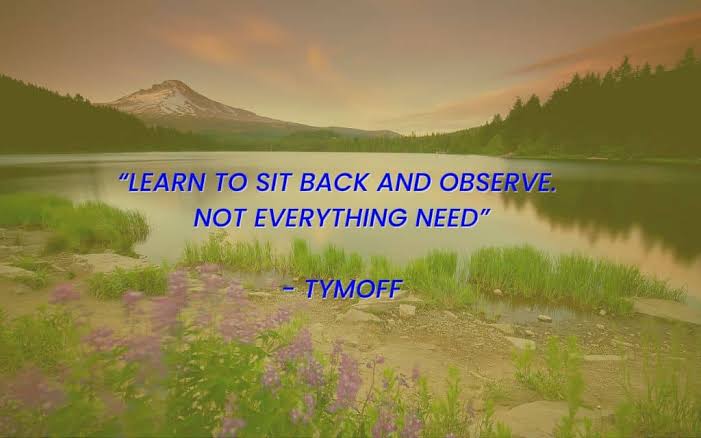learn to sit back and observe. not everything need – tymoff

In an era dominated by the rapid exchange of information and the pressure to react instantaneously. The sage advice to “learn to sit back and observe” serves as a beacon of wisdom. This Tymoff guide delves deeply into the philosophy of observation over reaction, shedding light on how this practice can significantly enrich our personal and professional lives. By cultivating a mindset that prioritizes observation. We open ourselves to a broader understanding of the world, fostering a life marked by thoughtful actions and deeper connections.
Understanding the Power of Observation
Observation is an art that transcends mere seeing. It involves engaging all our senses, allowing us to absorb the nuanced tapestry of our environment. This practice invites a profound appreciation for details often overlooked, fostering a connection with the intricacies of life that form the backdrop to our existence. When we learn to observe, we do more than witness. We interpret and understand, paving the way for insights that inform our decisions and actions.
The journey to becoming an effective observer starts with mindfulness. By anchoring ourselves in the present moment, we become attuned to the subtleties of our surroundings and our inner selves. This mindful approach to observation is not passive; it is an active engagement with the world, requiring discipline and curiosity. It challenges us to question our preconceptions and biases. Urging us to look beyond the surface and appreciate the complexity of life.
The Case for Non-Reaction
The instinct to react to every stimulus is deeply ingrained in human nature. Yet, this reflex can often lead us astray, prompting decisions and actions that may not align with our long-term goals or values. The principle of non-reaction is not an endorsement of passivity; rather, it advocates for a measured, thoughtful approach to life’s challenges. It encourages us to pause, assess, and then act, ensuring that our responses are considered and constructive.
Embracing non-reaction means recognizing that silence can be powerful and that inaction can be strategic. It teaches us patience, allowing time for situations to unfold and reveal their outcomes without our interference. This practice is particularly valuable in today’s fast-paced world, where the pressure to respond can lead to hasty, ill-considered decisions. By learning to sit back and observe, we gain the ability to discern when to step forward and when to stand back, enhancing our effectiveness in both personal and professional realms.
Implementing the Tymoff Approach in Everyday Life
Adopting the Tymoff approach to observation and non-reaction requires intentionality and practice. It begins with cultivating an environment conducive to mindfulness. This might involve setting aside time for meditation, engaging in regular periods of quiet reflection, or simply making a conscious effort to be more present throughout the day.
Active listening is another critical component of the Tymoff approach. By fully engaging with others when they speak, we not only gain deeper insights into their thoughts and feelings but also foster stronger, more meaningful relationships. This practice of attentive listening extends to our interactions with the world at large, encouraging us to absorb and reflect rather than immediately react.
Journaling can also be a powerful tool in the journey toward becoming a more effective observer. By recording our observations and reflections, we develop a deeper understanding of our thought processes and emotional responses. This self-awareness is invaluable, guiding us toward more mindful and intentional living.
The Transformative Impact of Observation
The benefits of learning to sit back and observe extend far beyond personal growth. Professionally, it can lead to enhanced leadership skills, as it fosters a culture of thoughtful decision-making and empathetic engagement. It can improve problem-solving abilities, as observation provides a richer context for understanding challenges and devising innovative solutions. Moreover, it can enhance creativity, as the act of observation stimulates the imagination, encouraging us to see the world in new and exciting ways.
Read also: love what you have, before life teaches you to lov – tymoff
Conclusion
The Tymoff guide to learning to sit back and observe offers a path to a richer, more reflective life. This approach, grounded in the principles of mindfulness, non-reaction, and active engagement with the world, empowers us to live more thoughtfully and intentionally. It reminds us that not everything requires our reaction and that, sometimes. The most powerful action we can take is to simply observe. By embracing this philosophy, we can navigate the complexities of life with wisdom, compassion, and a deep appreciation for the beauty that surrounds us.



